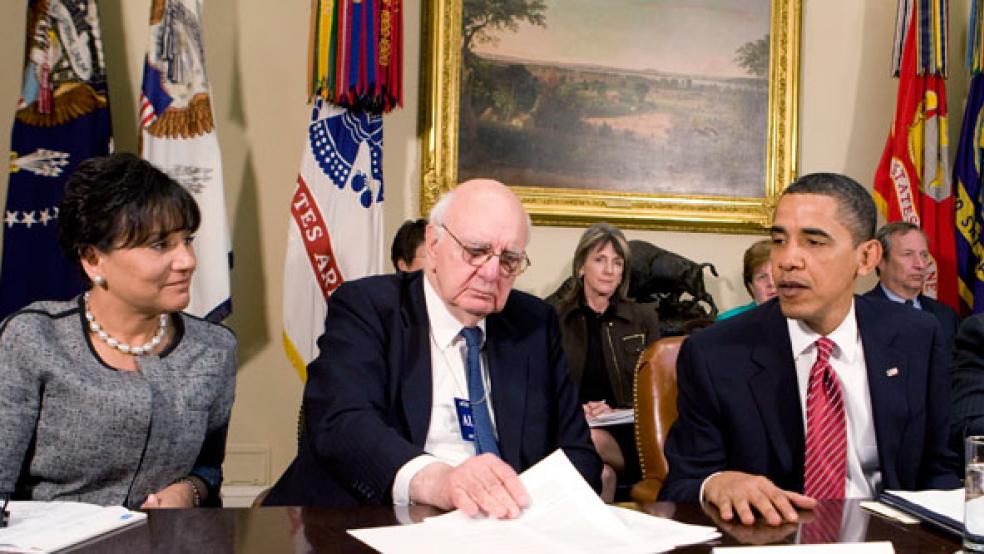Billionaire hotel heiress Penny Pritzker is reportedly in the mix to become Commerce secretary—a cabinet post that’s been vacant for a total of 12 months during the course of Barack Obama’s presidency.
She has a unique edge over some of the other names being floated for the Commerce Department, including American Express CEO Kenneth Chennault, Xerox CEO Ursula Burns, and Karen Mills of the Small Business Administration.
Pritzker, 53, was Obama’s chief fundraiser in 2008—what political consultants call a “bagman.” Her efforts more than four years ago helped to generate $745 million for the campaign and another $53 million for the inauguration. The Chicagoan played a more subdued role in Obama’s re-election last year.
The Chicago Sun-Times reported last month that she was a potential candidate. Pritzker withdrew from consideration for Commerce back in 2008, supposedly out of concerns that some of her family’s business decisions would make for a nasty confirmation process. Her family’s wealth is both an asset and liability—as billionaires are one of the few groups Obama accuses of not doing their “fair share” and the family hotel chain, Hyatt, has a tortured history with labor unions.

But weird as it might sound, Prizker’s bagwoman past would be helpful at Commerce. As a general principle, that personal relationship is critical for succeeding in DC.
“The effectiveness of any cabinet secretary, regardless of the position, is the degree to which that individual has the confidence and ear of the president,” said David Sampson, the former deputy Commerce secretary under George W. Bush who is now CEO of the Property Casualty Insurers Association of America.
Pritzker would have instant credibility because of her personal relationship with Obama, unlike his two previous Commerce secretaries—former Washington Gov. Gary Locke and utility executive John Bryson. White House logs show she made 68 different visits through the middle of last year, meeting with Obama and top advisers such as Valerie Jarrett.
Although Commerce is a second tier cabinet post, hHer appointment would likely quell recent criticism that the president has elevated men to top slots instead of women. The current acting Commerce secretary is Rebecca Blank, an economist from the University of Michigan.
The position would also make her the unofficial ambassador to the business community, a group that largely regards much of the Obama administration with suspicion. The principle is particularly true at Commerce, where the portfolio includes foreign trade, the patent office, the Census Bureau, and the National Oceanic and Atmospheric Administration.
Bill Clinton made Ron Brown, then chairman of the Democratic National Committee, his first Commerce secretary in 1993. After Brown died in a 1996 plane crash, Clinton next chose Mickey Cantor, chairman of his 1992 presidential run.
George W. Bush also assigned his campaign chairman, Donald Evans, to the position. Similarly, his father George H.W. Bush appointed a political confidante by picking oilman Robert Mosbacher in 1989.
Choosing a close ally for Commerce sends a signal that the business community is important to the White House—a perception that the administration has not been able to fix thus far. “All of the evidence from the president’s first term would seem to indicate that this is not a high-priority position for the administration to fill,” Sampson said.
Obama has struggled to overcome a strained rapport with corporate America. Besides the absence of a Commerce secretary since June, the administration has bungled other attempts to rally support inside C-suites.
His second chief of staff Bill Daley (another Clinton-era Commerce secretary who was tapped by Obama to work with business) had little pull inside the West Wing. And the Obama administration decided last week to discontinue its Council on Jobs and Competitiveness, whose members included many of the country’s most prominent CEOs. To complicate matters further, Obama last year proposed abolishing the Commerce Department and replacing it with a new agency devoted solely to trade issues.
Former Commerce Secretary Carlos Gutierrez, who held the post during George W. Bush’s second term after running cerealmaker Kellogg’s, told POLITICO last year, “I’m just speaking from the record, it is not an administration that has distinguished itself with pursuing new markets.”
Pritzker—who served on the Jobs Council—could in theory help fix the anti-business perception. When the Harvard and Stanford grad took a less prominent role in the 2012 campaign to focus on her own investments and business, some corporate bundlers worried. “Donors have asked, ‘Where’s Penny?’ ” Andy Spahn, a Democratic consultant in Los Angeles, told The New York Times in July. “We have called her and not gotten callbacks.”
But the obstacle for all campaign bagman is that they carry baggage. The same troubles from 2008 could easily surface again.
Pritzker’s resume includes a nasty clash with organized labor, as the union UNITE HERE has picketed and protested Hyatt hotels for their treatment of housekeepers. As the head of multiple real estate and investment interests, she belongs to the Hyatt board of directors and became a focal point of criticism because of her proximity to Obama.
Then there is the legacy of Superior Bank—which collapsed in 2001 because of sub-prime loans and troubled accounting practices. The Pritzker family controlled the bank with a family friend and it was Penny who chose to pay a $460 million fine to regulators, according to a 2003 Vanity Fair article.
When Pritzker made the choice, she considered it her patriotic duty.
“It was right after 9/11,” one of her associates told the magazine, “and she called me and said, ‘My family is not going to litigate with the federal government at a time like this.’ ”




